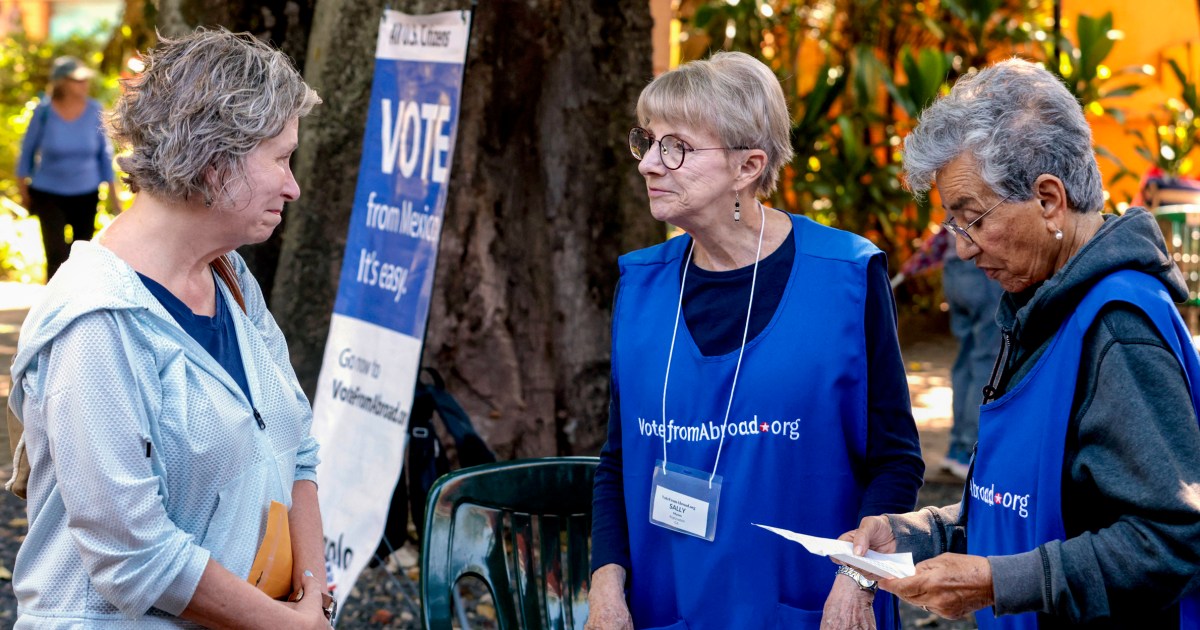Democrats invest in American voters abroad hoping to make the difference
HONG KONG — With the U.S. presidential race a dead heat in the last days before the election, Democrats and Republicans are seeking votes not just in every corner of the United States but also around the world.
The Federal Voting Assistance Program (FVAP) estimates there are almost 3 million eligible American voters living outside the U.S., including tens of thousands of U.S. service members and their families.
Voter turnout among this group is low — less than 8% in the 2020 presidential election, according to FVAP, compared with almost 67% overall. That is largely due to confusion and difficulties regarding how to request and return ballots, with each state having different rules and deadlines that can include allowing ballots to be returned by email or fax.
Still, the votes of overseas Americans are important enough that both parties are courting them, and some Republican lawsuits have sought to block them.
Overseas voters “can sway an election, especially in the swing states,” said James Lockett, chair of Democrats Abroad Hong Kong.
Americans living abroad, who come from all parts of the political spectrum but are thought to lean Democratic, often have a more global perspective on foreign policy and other issues than other American voters, Lockett said.
“By living overseas, you see things firsthand up close, upfront, so you know exactly what’s going on on the ground,” he said.
For the first time in a presidential election, the Democratic National Committee provided Democrats Abroad $300,000 in funding this year to help with voter registration and other efforts to mobilize the overseas vote.
“This election will be won on the margins, and every single vote counts,” DNC Deputy Communications Director Abhi Rahman said in a statement. “We’re going to win this election by engaging every eligible voter, no matter where they live.”
Lockett, who votes in Texas, said the DNC funding had helped Democrats Abroad communicate more effectively.
“We are seeing a big increase of people voting this year just because we’re getting the word out,” he said.
According to the DNC, there are about 1.6 million Americans abroad who are eligible to vote in the seven battleground states of Arizona, Georgia, Michigan, Nevada, North Carolina, Pennsylvania and Wisconsin. In 2020, Biden won the presidency by just 44,000 votes across Arizona, Georgia and Wisconsin.
During the 2022 midterm elections, overseas voters also made the difference in close races in Connecticut, New Hampshire and North Carolina, the DNC said.
Republicans have brought lawsuits in Michigan, North Carolina and Pennsylvania seeking to block what they say is illegal overseas voting. All three have been dismissed.
In a letter to Defense Secretary Lloyd Austin, six House Democrats expressed concern that the Pennsylvania lawsuit, which was brought by six Republican congressmen from the state, would “usurp the right to vote from our men and women in uniform, as well as their families.”
The Republican National Committee, which brought the lawsuits in Michigan and North Carolina, did not respond to a request for comment. In a statement last week announcing its intention to appeal the dismissals, an RNC spokesperson said, “We are fighting to protect every legal vote, including from military and overseas citizens, to not be canceled by ineligible votes,” Reuters reported.
Even as Republicans raise concerns about overseas voters, their presidential nominee, former President Donald Trump, appears to be seeking their support. Earlier this month, he expressed opposition to the double taxation of overseas Americans, who are required to file U.S. income taxes each year regardless of where they live and are taxed on earned income above $126,500 in addition to the taxes they owe in the countries and territories where they reside.
“I support ending the double taxation of overseas Americans,” Trump told The Wall Street Journal, without providing details.
The only other country in the world that taxes the income its citizens earn overseas is Eritrea, said Solomon Yue, chief executive of Republicans Overseas. Removing double taxation was discussed during negotiations over the 2017 tax bill that Trump signed into law, but ultimately it wasn’t included.
Vice President Kamala Harris, the Democratic presidential nominee, has not announced any tax policies for Americans abroad. Her campaign did not respond to a request for comment.
Trump’s stance on double taxation could sway overseas American voters, including Democrats, for whom it’s a “pocketbook issue,” said Yue, an Oregon voter who was a longtime RNC official.
“It’s as personal as it gets,” he said, as well as a “constitutional principle.”
“You’ve got to treat everybody equally,” he said. “You can’t treat overseas Americans as second-class citizens, and I don’t care if they are Republicans, Democrats or independents.”


